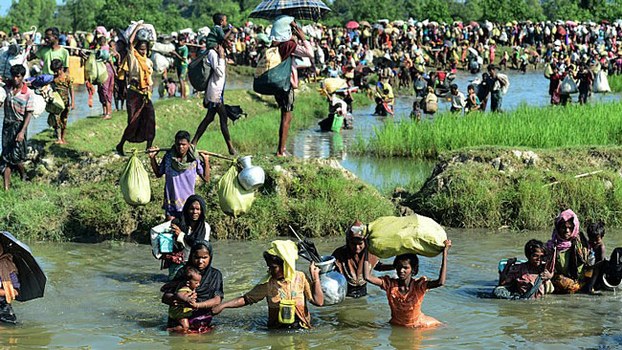




Myanmar politicians and observers on Wednesday warned that sanctions imposed by Western nations on the Southeast Asian country for the military’s brutal crackdown on Rohingya Muslims in northern Rakhine state could have negative impacts on its economic development and transition to democracy.
Their comments came in response to a move by the U.S. government on Tuesday to halt consideration of travel waivers for senior military leaders under a 2008 act and push for targeted sanctions against Myanmar officers involved in violence against the Rohingya.
The U.S. said it would rescind invitations for senior military officials to attend U.S.-sponsored events and would deem military units involved in operations in northern Rakhine ineligible to participate in U.S. assistance programs. It also called for unimpeded access to northern Rakhine for a United Nations fact-finding mission, international organizations, and the media.
The Myanmar military has been heavily censured by the international community for committing indiscriminate acts of murder, torture, rape, and arson in Rohingya villages during a crackdown following deadly terrorist attacks on police outposts on Aug. 25 in northern Rakhine.
The violence has driven more than 600,000 Rohingya over the border into neighboring Bangladesh where they now live in refugee camps.
Rights groups and the U.N. have hit out at the army, saying its atrocities against the Rohingya amount to ethnic cleansing, though the U.S. government on Tuesday declined to apply the term to the situation in northern Rakhine.
Khin Maung Swe, chairman of National Democratic Force (NDF), a political party formed in 2010 as a breakaway faction of the current ruling National League for Democracy (NLD) party, said sanctions imposed by the U.S. could damage Myanmar’s slowly developing economy.
“Suspending invitations to senior military officials is not a problem, [but] if these military officials’ businesses are sanctioned, some of the businesses and the economy may be hurt,” he said.
Khin Maung Swe also said the U.N. and international media have blamed Myanmar and its military leaders for the Rohingya crisis, though State Counselor and de facto national leader Aung San Suu Kyi has said that she cautioned the military to very carefully carry out security campaigns in northern Rakhine.
“But they don’t count what she said,” he said of the international community.
“It seems this Bengali problem is very important for them,” he said, using a derogatory term for the Rohingya, whom Myanmar considers illegal immigrants from Bangladesh. “If so, we have nothing to say, and the truth will come out one day.”
Aung Thein, an attorney with the Myanmar Lawyers Network, defended Myanmar’s use of force in northern Rakhine and said new sanctions would hurt Myanmar’s economic development.
“Should [we] just stand by and watch these terrorists who encroached upon Myanmar’s sovereignty?” he asked, referring to Muslim militants from the Arakan Rohingya Salvation Army (ARSA), who carried out the Aug. 25 attacks. “Every country resolves such problems with military operations when its sovereignty is encroached upon.”
“Our economy will slow down if they impose sanctions on Myanmar,” he said. “We will not get any help from the rest of the world and the World Bank. I think they are pressuring us because of Muslim countries’ voices.”
‘Put in a difficult situation’
Political analyst Yan Myo Thein said new restrictions and sanctions might force Myanmar to turn away from the West.
“If Western countries, including the U.S., impose sanctions on Myanmar, the government led by Daw [honorific] Aung San Suu Kyi and President Htin Kyaw will be put in a difficult situation,” he said. “I am worried that this situation could force the Myanmar government to depend on China and Russia because of Western countries’ sanctions.”
He said it is important for Western countries to work with the Myanmar government and military to solve the current crisis according to international human rights and legal standards.
The administration of former U.S. President Barack Obama had praised Myanmar’s progress in its transition to democracy under Nobel laureate Aung San Suu Kyi, the country’s de facto leader whose government has now been in power for more than 18 months.
Before Obama left office, he dropped remaining sanctions against Myanmar, though restrictions on the U.S.’s already-limited engagement with the Myanmar military and its long-standing embargo on all military sales remained in place.
Since coming to power, Aung San Suu Kyi has been sharply criticized for not speaking out about the treatment of the Rohingya and not doing enough to stop the violence against the minority group at the hands of state security forces following the Aug. 25 ARSA attacks and deadly smaller scale raids by the same group in October 2016.
Nyo Ohn Myint of the government-affiliated Myanmar Peace Center (MPC) in the commercial capital Yangon said Obama’s policy of engagement was more beneficial to Myanmar’s democratic reform process than was the previous sanctions policy.
“Present Obama used a constructive engagement policy with Myanmar by maintaining a close relationship and persuading it to move forward with political reform,” he said.
“The international media keep saying that the Myanmar military used a lot of troops in its operations in Rakhine, but it is not true,” he said. “I think the international media and leaders have fallen into a trap set by ARSA. If these countries sanction Myanmar, [its] democratic transformation will be harmed.”
Reported by Khin Khin Ei for RFA’s Myanmar Service. Translated by Luisetta Mudie. Written in English by Roseanne Gerin.